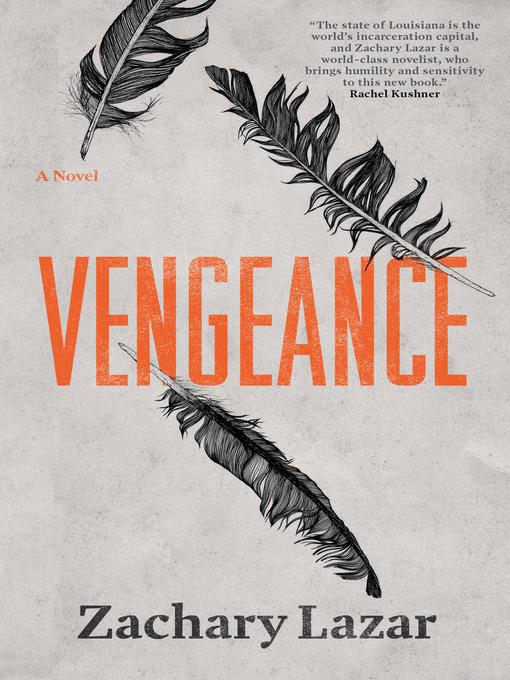
Vengeance
A Novel
کتاب های مرتبط
- اطلاعات
- نقد و بررسی
- دیدگاه کاربران
نقد و بررسی

December 1, 2017
A writer looks for the truth about a crime and might find out more than he wants to.While attending rehearsals for an Easter pageant in a Louisiana prison, an unnamed novelist meets Kendrick King, a black man serving a life sentence. Like the pageant's main character, King maintains his innocence. He was only found guilty, he says, because "the truth was too confusing." Curiosity piqued, the writer/narrator of Lazar's fifth book (I Pity the Poor Immigrant, 2014, etc.) begins his own investigation. As in much of Lazar's earlier work, the plot resembles a labyrinth of coincidences and competing perspectives. It obeys the unbending rule of postmodern fiction: the more closely you look at a narrative, the more elusive the truth must become. On a more original note, the narrator admits that his skepticism about Kendrick's story might also be a way of avoiding simple but hard truths about America's criminal justice system, which ruins countless lives for dubious reasons. This is a timely epiphany, but it could arrive with more emotional force than it does here. Although the imagery in the novel is unfailingly vivid (Kendrick has "Weimaraner eyes," a detective has "a half-moon scar like the sear mark left by the edge of a heated bottlecap"), the characters are too vague to elicit deep sympathy. Perhaps Kendrick needs to remain a mystery. But the narrator, too, is oddly insubstantial. In a rare exception, he lies in a sensory deprivation tank and feels "the heart's steady thud" and knows in a flash that "the body is its servant...all of it is for the heart, not for the brain." It's a vital thing for this novelist to know in theory, but he hasn't yet put it into practice.This heady novel could use more heart.
COPYRIGHT(2017) Kirkus Reviews, ALL RIGHTS RESERVED.

January 1, 2018
Lazar (Evening's Empire; Sway) writes fiction, journalism, and, as he says, "sometimes a hybrid of both." This powerful new novel about a murder investigation, mass incarceration, and the monstrously powerful, profoundly entrenched structural racism in the United States, reads like the best investigative journalism. But it is also deeply literary--with vividly drawn characters, a compelling narrative arc, and philosophical reflections on the nature of justice and perception. The story is set at the massive Angola Prison system in central Louisiana, on land that had once been slave plantations. While visiting the penitentiary with a photographer friend documenting an inmate theater production, the narrator of the novel, who appears to be Lazar himself, befriends an inmate serving a life sentence for murder. Over the course of the novel, after talking over many months with everyone connected to the crime, the narrator is left with a baffling jumble of stories, claims, and counternarratives. The only thing that seems certain is that this inmate, Kendrick King, does not appear to deserve the punishment he has received. VERDICT A complex meditation on race in America and on the unpredictable ways that ordinary lives can veer tragically off track.--Patrick Sullivan, Manchester Community Coll., CT
Copyright 2018 Library Journal, LLC Used with permission.

February 5, 2018
Lazar’s fourth novel (after I Pity the Poor Immigrant) is a moving if hyper-intellectualized meditation on wrongful imprisonment and America’s broken criminal justice system. The work is inspired by a rendition of The Life of Jesus Christ that the author saw performed at the Louisiana State Penitentiary at Angola, and includes rough biological sketches from his own life. The book’s unnamed narrator is a fiction writer and journalist who visits Angola to interview inmates and document their lives. There, he meets Kendrick King, a 31-year-old black man who has already served nine years of his life sentence for murder. The catch: King insists he’s innocent. Over the next several years, the narrator becomes more invested in King’s case and interviews those close to King: his mother, his estranged brother, and the mother of King’s now-teenage child. In doing so, he becomes convinced not only of his own insignificance, but also of the futility of King’s predicament. When unpacking King’s complicated backstory, Lazar ruminates on hot-button issues—racial profiling and discrimination, police brutality, incarceration and rehabilitation, poverty and privilege—but the lack of three-dimensional characters diminishes the impact of these ideas. Readers looking for an analytical, thorough examination of the justice system will find much to consider here.

December 1, 2017
The line between fiction and nonfiction blurs in Lazar's hands. This novel reads like nonfiction, and its unnamed narrator shares some biographical details with the author, notably in the murder of their fathers when they were young. The narrator is a journalist attending a passion play at the Louisiana State Penitentiary at Angola when he first meets Kendrick King, then 31 and in his ninth year of a life sentence for second-degree murder, of which he claims he's innocent. The man who actually shot the victim got 25 years in a plea bargain, while King got life for refusing a plea deal, insisting on his innocence. The narrator digs into King's case over the course of several years, talking to his mother, brother, cousin, and two girlfriends as he gathers their accounts and those of King himself, trying to get the whole truth. Meanwhile, King studies philosophy and religion, intending to be a minister but unlikely to achieve his sole wish for freedom. A vivid and unblinking view of the justice and penal systems in modern America.(Reprinted with permission of Booklist, copyright 2017, American Library Association.)

























دیدگاه کاربران